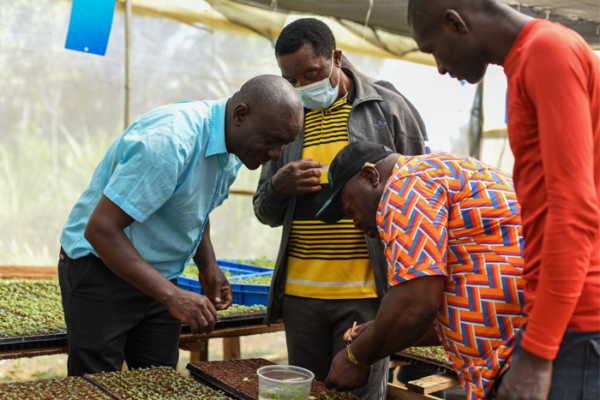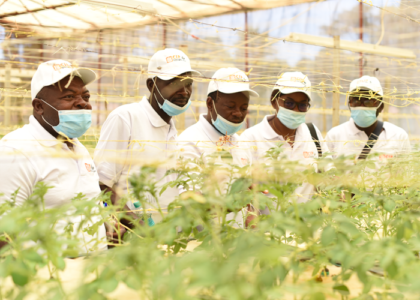
Potato is an important food and nutritional security crop in sub-Saharan Africa. However, a quick look reveals a glaring challenge faced by farmers across the continent: limited access to quality seed potato.
The situation is no different in Cameroon, where national annual production is only 300,000 metric tonnes – well below the national demand estimates of one million metric tonnes. Furthermore, with increased production, Cameroonian farmers could profit through export opportunities with neighboring countries, such as Chad, Gabon, and the Central African Republic, among others.
However, access to certified or clean potato seed is extremely low (<5%), which means most farmers recycle old, degenerated seed potato for subsequent crops, producing, on average, between 7-10 tonnes per hectare (t/ha), which is far below reasonable potential yields of 20-30 t/ha.
But recent success in Kenya – supported by the International Potato Center (CIP) – holds great promise for Cameroon and other SSA countries where potato can play a more key role in addressing food and nutrition security concerns.
Working with local Kenyan partners, CIP has helped to build and coordinate production of and access to starter materials to produce certified seed from minitubers. These materials include basic seed and rooted apical cuttings to produce clean seed that brings higher yields and presents attractive income opportunities for smallholder farmers, especially women. .
To learn more from the Kenyan success story, CIP and the Green Innovation Centres for the Agriculture and Food Sector Project (ProCISA) organized a trip for 12 Cameroonian delegates, including the Institute of Agricultural Research for Development (IRAD), the Ministry of Agriculture and Rural Development (MINADER), and private seed producers from different regions to learn more about building capacity for early generation seed potato production and field multiplication through the latest innovations in technology and policy.
“Kenya is more advanced in seed potato production and capacity. We came to learn and see if we could adopt the models here. Things will change. The organizing of seed actors is only the beginning,” said Julie Teh Nguh, the Deputy Director of Agricultural Seed Systems at MINADER.
The Cameroonian Context
Currently, seed producers in Cameroon import most of their seed from the Netherlands and France to multiply and sell. However, this seed can only be multiplied for two seasons and becomes unproductive after that. Moreover, the seed they produce is often too expensive for most smallholder farmers in the country.
The delegation to Kenya learned the basics for setting up labs and systems for producing clean potato seed that can be sold at lower cost, but with higher quality, than imported seed.
At the Kenyan Agricultural and Livestock Research Organization (KALRO), the delegation saw first-hand how tissue cultures from the lab were produced in bulk and distributed to provide producers to ramp up the amount of available seed. As a result, Kenyan farmers have noticed a sharp decline in bacterial wilt in their potato crops.
“Everything begins in our lab. We cannot fail at this stage… “As the demand for clean seed grows, seed producers will need tissue culture materials soon and in bulk. We need to multiply fast and in the best aseptic conditions. I need to get my team up to date with the lessons I have learnt from this trip,” said Rauwitta Omabit, a tissue culture specialist with IRAD.
Following the lab visit, the delegation went to Kisima Farms, a private seed-producer farm in Meru County that uses aeroponics to produce seed potato, and Stockman Rozen Kenya, another private firm that works with rooted apical cuttings and other local producers to mass produce clean seed.
In Kenya, 15-25 tubers can be produced per one apical cutting, which can then be multiplied up to three times in the field.
“My first action will be to build a screenhouse. I want to start doing business with apical cuttings from the plantlets and supply them to farmers. The other technology, like aeroponics, will take more long-term planning,” said Norbert Kenfack, the chairman of PROPOTEM, a farmers’ cooperative in western Cameroon.
Market-preferred varieties
But clean seed for improved production is not enough. Elevated yields will not address food and nutrition security challenges if the varieties being produced are not purchased in the market place.

KALRO has released some CIP-bred-high yielding and climate-smart varieties to farmers based on market research which predicted their popularity. Unica is the new favorite variety with farmers, but they have more options to choose from.
“We also need to develop and improve local varieties. We need competitive varieties. Many of our varieties are important, said Clement Wara, a private seed producer. “We would love to have Unica and other CIP varieties added to our national catalogue.”
Finally, the Cameroon delegation was advised to promote the formation of farmer groups to accelerate the spread of innovative ideas and varieties among communities.
Wachira Kaguongo, the CEO of the National Potato Council of Kenya (NPCK), said their success owed much to marketing and clean seed promotional efforts led by farmers. And that digital platforms were available to scale up and organize information;
“Our Viazi Soko (website) provides end-to-end value chain information from production to marketing of potato as well as weather advisory service for all stakeholders. Through this platform, farmers can place seed orders in advance, and NPCK will organize scheduled deliveries,” Kaguongo said.
The Cameroonian team spent five days total in Kenya, acquiring key ideas to create a recipe for success in boosting potato production in their country through careful capacity and partnership building.
CIP would like to recognize and thank Deutsche Gesellschaft für Internationale Zusammenarbeit (GIZ) for their generous support of potato research in Cameroon.
More photos of the visit are available here.
Blog by Nathan Ronoh with contributions from Shadrack Nyawade, Dieudonne Harahagazwe and Victorine Fornkwa
